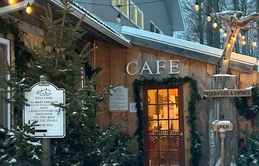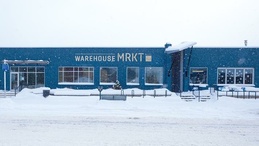The State Of Tolerance
March 11, 2012

Panel to discus diversity and intolerance around Northern Michigan. It’s pretty good in TC, less so in some rural areas.
When attorney Blake Ringsmuth was growing up in TC in the 1970s and 1980s, it was a much different, much less tolerant place.
He left to go to college and law school and begin a career and when he decided to move back to his hometown in the mid- 1990s, he was worried about what he was getting himself into. Would this be the same backward place he remembered from his youth? Or was Northern Michigan somehow getting more progressive?
Soon after he moved back there was a news story about a cross burning in Grawn and Ringsmuth thought his worst fears about coming home were coming true.
He wrote a letter to the editor about how appalled he was. And a few days later, after he saw that a dozen or so others had also written, he felt a little better. He began to see TC as a place he could again call home. He joined the city’s human rights commission and looked for ways to focus his practice on social justice.
THINGS HAVE GOTTEN BETTER
Things have gotten a lot better in the past 20 years. There haven’t been any cross burnings. When anti-gay activists attempted to stop a city commission-passed equal rights ordinance that protected minorities including homosexuals, they were soundly defeated at the polls in November.
Ringsmuth, now a board member with the ACLU of Michigan Northwestern, points to that as proof of a change in the fabric of the city.
"I think Traverse City has got a different perspective than perhaps the rest of Northern Michigan," he said. "Having grown up here and having lived here for the last 17 years, I think it has made some very significant progress."
TC may be more welcoming and tolerant, but that’s not to say there aren’t pockets of racism, he said. And that doesn’t mean the attitude radiates out of TC and throughout Northern Michigan.
"You’ll never wipe out the homophobia and the bigotry entirely, and there are still pockets of that," Ringsmuth said. "The good news is that those who still hold on to those beliefs are less likely to publicly express them."
HUMAN RIGHTS PANEL
The Traverse Area District Library and the TC Human Rights Commission are co-sponsoring a panel discussion about the state of tolerance in Northern Michigan next Tuesday. The event will take place at the TC branch of the library March 20 at 6:30 p.m.
The discussion will also focus on a Michigan notable book, the 2004 National Book Award nonfiction winner, "Arc of Justice: A Saga of Race, Civil Rights and Murder in the Jazz Age" by Kevin Boyle.
The book is about African-American physician Ossian Sweet and his travails after he purchased a home in a white neighborhood of Detroit in 1925. He chose to defend his home and family against an angry white mob and wound up on trial for murder.
The panel will be moderated by Marshall Persky, former human rights commission chairman.
While minorities in Michigan do not generate angry mobs when they move into a new neighborhood, there remains stealth racism that minorities are forced to deal with.
"˜VERY DARK UNDERCURRENT’
Perhaps nowhere are the struggles of minorities in Northern Michigan more evident than in the Hispanic community, which on top of racism also faces anti-immigration sentiment.
Father Wayne Dziekan has been devoted to working for justice for immigrants since May of 2007, when he took over as director of the Secretariat for Justice and Peace for the Diocese of Gaylord.
"On the plus side I think Traverse City is ahead of many places in Northern Michigan in the sense that it does have some very vocal people and groups," he said.
On the other hand, there is a "very dark undercurrent" of intolerance that also exists in the area, he said.
"I’m very grateful that there is a human rights commission," Dziekan said.
Even in the Catholic Church, there is hostility to immigration, despite the church’s position on the issue.
"There are many Catholics who are horribly angry about the church’s position and they refuse to see that these are teachings of the church," he said.
Dziekan’s associate, Silvia Cortes-Lopez, the director of the Hispanic Apostolate for the Diocese of Gaylord, will be a panel member at the diversity event at the library.
FAMILY HARASSED
For an example of intolerance, take an incident that happened in a rural county in November.
It happened at the home of a Hispanic family the night before Thanksgiving.
"A stranger showed up at a family’s door. The man was drunk. The family was Hispanic and the stranger was white," Dziekan said.
The drunk man was unruly and yelling things at the family, like, "˜I know who you are and you’re illegal,’ though he could not have known the family, he said.
"He was trying to force his way into the house," Dziekan said.
It was undoubtedly a frightening and troubling experience, but the man eventually went away.
The next morning, however, the family noticed property missing from their yard. They figured the drunk man must be responsible.
They waited for a neighbor to help them and called police Thanksgiving evening.
When police arrived, however, according to Dziekan, they didn’t investigate the theft or what the white stranger had done. Instead, they demanded to see everybody’s immigration papers.
Two Hispanic men wound up arrested and turned over to federal officials.
CHURCH INTERVENES
Dziekan said it was wrong for police to ignore a crime committed against a Hispanic family and instead investigate immigration status. It runs counter to what police officers are trained to do in such instances, he said.
"That practice is considered unacceptable because it destroys the relationship between law enforcement and the immigrant community," he said.
It’s dangerous for police to follow that course because it makes it less likely Hispanics will call police.
Dziekan said he and others advocated on behalf of the men with federal officials and after a week they were freed and the proceedings against them were dropped. Dziekan said he does not know the men’s immigration status.
Dziekan said he was able to make headway with Immigration and Customs Enforcement because their stated policy is to make crime a priority over targeting people for immigration status, though he said in practice ICE’s priorities seem to be more about targeting illegals.
Dziekan said it is important for citizens to be active about immigration issues and make their views known, because it has an effect on how local immigration agents approach their jobs.
"It needs community attention so that federal agents realize, "˜Oh, the community is watching,’" he said.
He said most police treat Hispanics with fairness and respect.
"Overwhelmingly, what I find is that law enforcement officers are trying to be very careful about the way they do their jobs," Dziekan said. "In any group, there’s always bad eggs."
Trending

Welcoming the Winter Solstice: Rituals & Events for the Shortest Day of the Year
With the winter solstice quickly approaching, it’s hard not to notice how dark each day feels. Astronomically, this is… Read More >>
Camp Greilick Now Open!
It’s been a long road for the century-old Camp Greilick, which, after several dormant years, was acquired by Grand Tra… Read More >>
Men and Ugly Sweaters
Those two things don’t always go together, but on Dec. 19, you’ll see both out and about in Petoskey and Harbor … Read More >>


